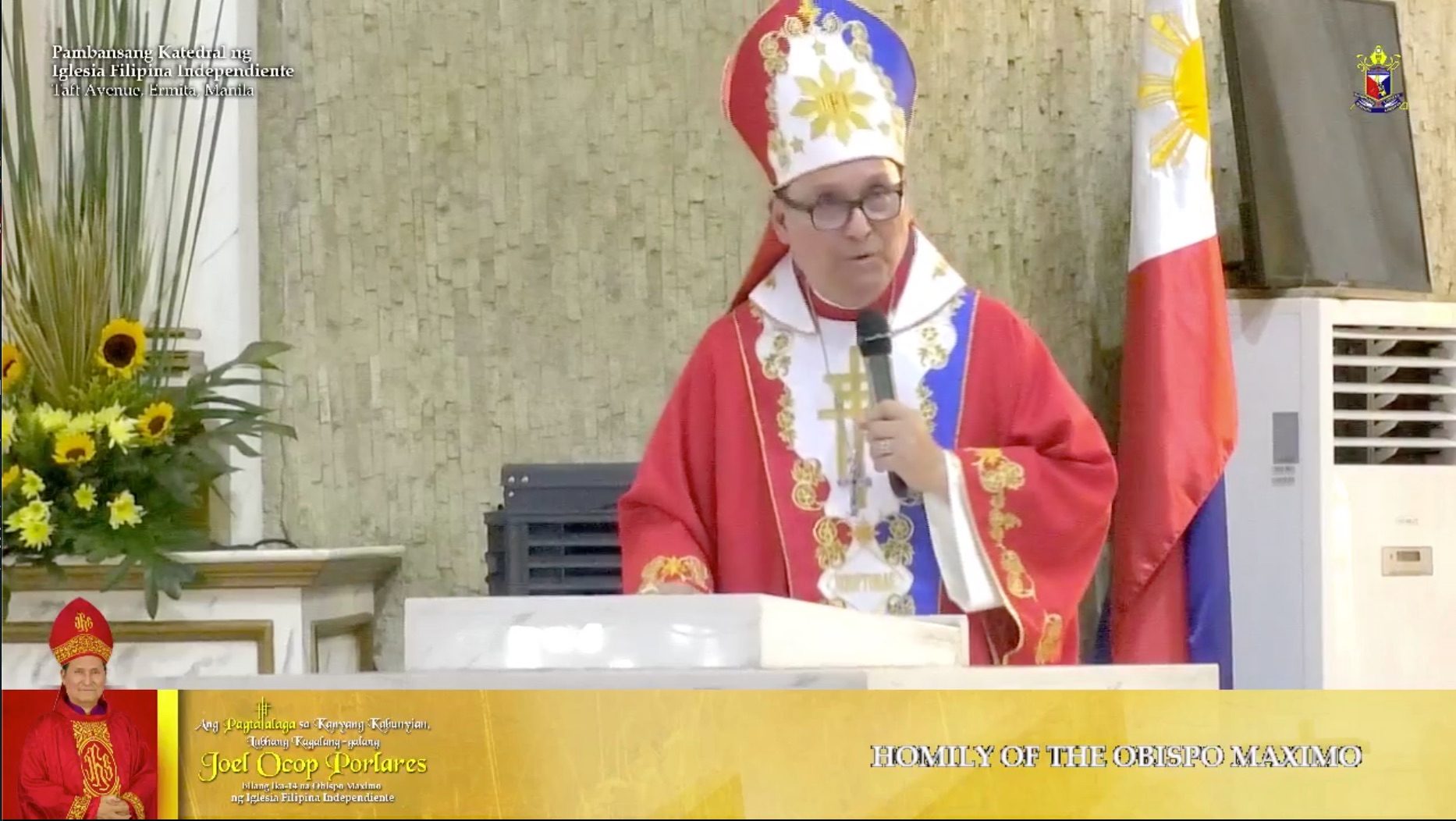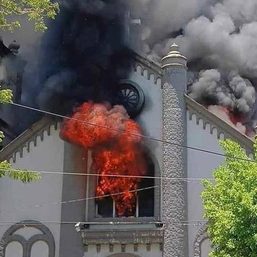SUMMARY
This is AI generated summarization, which may have errors. For context, always refer to the full article.

MANILA, Philippines – The Iglesia Filipina Independiente (IFI), a century-old church known for its revolutionary roots, installed its new leader during a ceremony in its cathedral in Ermita, Manila.
His Eminence Joel Ocop Porlares, 62, is the new Obispo Maximo or Supreme Bishop of the IFI. He succeeds Rhee Timbang who held the position for six years.
Commonly known as the Aglipayan Church, the IFI was founded in 1902 to resist the Spanish friars who had controlled the Roman Catholic Church in the Philippines for nearly four centuries.
An offshoot of the Philippine revolution against Spain from 1896 to 1898, the IFI was organized by labor leader (later senator) Isabelo delos Reyes of Vigan, Ilocos Sur, and Gregorio Aglipay of Batac, Ilocos Norte, a former Catholic priest who was excommunicated from the Catholic Church for his revolutionary activities in 1899.
Aglipay was the church’s first Obispo Maximo, serving in this role from 1903 until his death in 1940.
Porlares, the 14th Obispo Maximo, assumed office on Thursday, June 29, the Feast of Saints Peter and Paul, nearly two months after the IFI General Assembly elected him for a six-year term. IFI rules state that the Obispo Maximo “is the spiritual head, chief pastor, and chief executive officer of the church.”
‘Nationalist church with progressive character’
In a homily during his installation, Porlares urged believers to “make concrete God’s love in every time and every place,” as a church “that embraces its revolutionary past.”
He recalled the IFI Statement of Mission issued in 1976, where they declared: “The IFI has always been loyal to the cause of her founding fathers in promoting the welfare and dignity of the common man, especially the laborers. We must, in all times and in all places, extend her pastoral ministry to the workers and laborers with whom she was identified since the beginning.”
The “fundamental stand of the IFI,” he stressed, is “pro Deo et patria” (for God and country).
“This tradition of service makes it easy for us to understand that every time and every place is about the imperative of responding to every situation, when and where God’s love needs to be manifested,” he said.
In a news release, the IFI also called themselves “a nationalist church with a progressive character,” owing to “its roots in the liberation movement.”
Speaking out on sociopolitical issues
Porlares was born in Tacloban City but was raised in Basey, Samar, according to a news release by the IFI. His father was also an Aglipayan priest. Porlares is married and has three sons, according to the church, as their clergy are allowed to marry.
The new Obispo Maximo finished his bachelor’s degree in theology and, later, his master’s degree in divinity at Saint Andrew’s Theological Seminary, Quezon City.
Ordained as IFI priest in 1984, he served as priest in the greater Manila area, western Pangasinan, Bataan, and Bulacan, where he became bishop, said the IFI. He was elected IFI general secretary in 2017, his most recent post before becoming Obispo Maximo.
Porlares has also been serving as vice chair of the National Council of Churches in the Philippines, a 60-year-old group of Christian churches in predominantly Catholic Philippines, since 2019.
As Obispo Maximo, Porlares is expected to lead the IFI in speaking out on a host of sociopolitical issues, which the church has done across different administrations.
The IFI was one of the staunchest critics of drug war killings under former president Rodrigo Duterte. In 2019, an Aglipayan group even rejected Duterte’s Senate bets and endorsed a mix of 10 opposition and independent candidates. The church’s resistance came at a cost, however, with its bishops among those who were red-tagged under Duterte’s watch.
Earlier this year, the IFI made headlines again after it ordained its first trans woman clergy, 28-year-old Wowa Ledama of Padagian City, on February 24. Unlike the Roman Catholic Church that ordains only biological males, the IFI had its first women priests in 1997, and its first woman bishop in 2019.
Seeking better ties with Roman Catholics
While involving itself in national issues, the IFI – which counts around seven million members around the world – also seeks to promote unity among different Christian churches.
In his homily on Thursday, Porlares said he wants to “pursue and sustain the image of the IFI as one of the vanguards of the ecumenical movement in the Philippines.”
“Ever since, many bishops have dreamt of having a relationship somehow with the Roman Catholic Church, the mutual recognition of baptism,” he said in a mix of English and Filipino.
Porlares noted efforts of his predecessors to reach this objective, such as writing to the Vatican and meeting with Pope Francis when he visited the Philippines in 2015.
“I think and believe that we need to continue this dialogue,” Porlares said, as he also noted that he once studied canon law at the University of Santo Tomas in Manila.
“I believe that these little encounters in parishes, our missions where we have encounters with the Roman Catholic Church, I believe these should prosper. These should make us closer to each other,” Porlares said. – Rappler.com
Add a comment
How does this make you feel?
![[Pastilan] When ‘till death do us part’ sounds like a threat](https://www.rappler.com/tachyon/2024/06/TL-woman-divorce-abuse-june-11-2024.jpg?resize=257%2C257&crop_strategy=attention)


![[OPINION] Church heritage is God’s story](https://www.rappler.com/tachyon/2024/04/church-heritage-april-26-2024.jpg?resize=257%2C257&crop=409px%2C2px%2C1077px%2C1078px)

There are no comments yet. Add your comment to start the conversation.